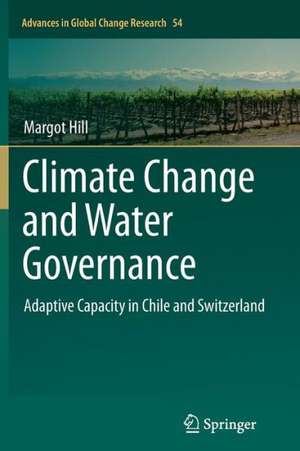Climate Change and Water Governance: Adaptive Capacity in Chile and Switzerland: Advances in Global Change Research, cartea 54
Autor Margot Hillen Limba Engleză Paperback – 14 dec 2014
| Toate formatele și edițiile | Preț | Express |
|---|---|---|
| Paperback (1) | 644.18 lei 6-8 săpt. | |
| SPRINGER NETHERLANDS – 14 dec 2014 | 644.18 lei 6-8 săpt. | |
| Hardback (1) | 656.25 lei 6-8 săpt. | |
| SPRINGER NETHERLANDS – 13 noi 2012 | 656.25 lei 6-8 săpt. |
Din seria Advances in Global Change Research
- 15%
 Preț: 636.12 lei
Preț: 636.12 lei -
 Preț: 439.83 lei
Preț: 439.83 lei - 18%
 Preț: 895.45 lei
Preț: 895.45 lei - 15%
 Preț: 648.24 lei
Preț: 648.24 lei - 18%
 Preț: 1036.54 lei
Preț: 1036.54 lei - 18%
 Preț: 894.16 lei
Preț: 894.16 lei - 18%
 Preț: 963.60 lei
Preț: 963.60 lei - 18%
 Preț: 1239.49 lei
Preț: 1239.49 lei - 15%
 Preț: 649.71 lei
Preț: 649.71 lei - 18%
 Preț: 1243.78 lei
Preț: 1243.78 lei - 18%
 Preț: 1114.02 lei
Preț: 1114.02 lei - 15%
 Preț: 648.89 lei
Preț: 648.89 lei - 18%
 Preț: 960.78 lei
Preț: 960.78 lei - 15%
 Preț: 643.99 lei
Preț: 643.99 lei - 18%
 Preț: 1834.44 lei
Preț: 1834.44 lei - 15%
 Preț: 649.06 lei
Preț: 649.06 lei - 18%
 Preț: 955.70 lei
Preț: 955.70 lei - 18%
 Preț: 956.03 lei
Preț: 956.03 lei - 18%
 Preț: 1232.26 lei
Preț: 1232.26 lei - 18%
 Preț: 955.88 lei
Preț: 955.88 lei - 18%
 Preț: 959.19 lei
Preț: 959.19 lei - 18%
 Preț: 944.82 lei
Preț: 944.82 lei - 18%
 Preț: 1105.19 lei
Preț: 1105.19 lei - 15%
 Preț: 644.49 lei
Preț: 644.49 lei - 15%
 Preț: 643.99 lei
Preț: 643.99 lei - 18%
 Preț: 1841.54 lei
Preț: 1841.54 lei - 18%
 Preț: 1225.94 lei
Preț: 1225.94 lei - 18%
 Preț: 954.62 lei
Preț: 954.62 lei - 5%
 Preț: 1414.80 lei
Preț: 1414.80 lei
Preț: 644.18 lei
Preț vechi: 757.85 lei
-15% Nou
Puncte Express: 966
Preț estimativ în valută:
123.28€ • 133.86$ • 103.55£
123.28€ • 133.86$ • 103.55£
Carte tipărită la comandă
Livrare economică 23 aprilie-07 mai
Preluare comenzi: 021 569.72.76
Specificații
ISBN-13: 9789400792418
ISBN-10: 9400792417
Pagini: 372
Ilustrații: XXIV, 348 p.
Dimensiuni: 155 x 235 x 20 mm
Greutate: 0.52 kg
Ediția:2013
Editura: SPRINGER NETHERLANDS
Colecția Springer
Seria Advances in Global Change Research
Locul publicării:Dordrecht, Netherlands
ISBN-10: 9400792417
Pagini: 372
Ilustrații: XXIV, 348 p.
Dimensiuni: 155 x 235 x 20 mm
Greutate: 0.52 kg
Ediția:2013
Editura: SPRINGER NETHERLANDS
Colecția Springer
Seria Advances in Global Change Research
Locul publicării:Dordrecht, Netherlands
Public țintă
ResearchCuprins
Contents.- Part I: Addressing Water Governance Challenges in the Anthropocene.- 1. Addressing Water Governance Challenges in the Anthropocene.- 2. Water Governance.- 3. Adaptive Capacity.- 4. The Assessment of Adaptive Capacity.- 5. Applying a Multi-Pronged Approach to Assessing Adaptive Capacity.- Part II: The Cases of Chile & Switzerland.- 6. Introducing the Case Study Areas: Hydro-climatic & Governance Background.- 7. Water Governance in the context of IWRM: Switzerland.- 8. Water Governance in the context of IWRM: Chile.- 9. Converging Threats: Driving pressures for Adaptive Capacity.- Part III: Applying the Assessment.- 10. Governance in the Face of Uncertainty and Change.- 11. Bridges and Barriers to Adaptive Capacity.- 12. Operationalising Adaptive Capacity.- 13. Assessing Adaptive Capacity.- Part IV: Challenges in Developing and Mobilising Adaptive Capacity.- 14. Balancing Structural Conflicts across Scales to develop and mobilise Adaptive Capacity.- 15. Coping with and Communicating Uncertainty.- 16. Addressing the Challenge of Institutional Infrastructure in a Technically focused World.
Textul de pe ultima copertă
Climate Change and Water Governance presents the results of several years’ research focusing on adaptive capacity and water governance in two widely-separated regions of the globe, namely the Swiss Alps and the Chilean Andes. The two regions share many similarities in hydrology and water resources: shifting precipitation patterns, highly variable winter snow pack and receding glaciers, resulting in changing seasonality and amounts of runoff that will subtly modify water availability and water use. As climate change is likely to amplify trends in surface run-off, the author investigates whether adaptive capacity in these two regions is sufficiently robust to respond to a situation which has never been experienced to date.
The book presents detailed case studies examining the Rhône Basin in the Canton Valais, Switzerland and the Aconcagua Basin in Valparaiso, Chile. In order to understand and assess the interplay of complex and interlinked environmental and socio-economic issues, the author looks beyond the technology, modelling, engineering and infrastructure associated with water resources management and climate change adaptation, to assess the decision-making environment within which water and adaptation policy and practices are devised and executed.
Using these insights, the author introduces, tests and enhances an indicator framework for the assessment of adaptive capacity. The aim is to help readers better understand the adaptive processes that allow the regimes governing water resources to respond to new shocks and changes in the hydrological system, in order to build more resilient water governance systems that can bend, but not break, in the face of new and unexpected challenges.
The book presents detailed case studies examining the Rhône Basin in the Canton Valais, Switzerland and the Aconcagua Basin in Valparaiso, Chile. In order to understand and assess the interplay of complex and interlinked environmental and socio-economic issues, the author looks beyond the technology, modelling, engineering and infrastructure associated with water resources management and climate change adaptation, to assess the decision-making environment within which water and adaptation policy and practices are devised and executed.
Using these insights, the author introduces, tests and enhances an indicator framework for the assessment of adaptive capacity. The aim is to help readers better understand the adaptive processes that allow the regimes governing water resources to respond to new shocks and changes in the hydrological system, in order to build more resilient water governance systems that can bend, but not break, in the face of new and unexpected challenges.
Caracteristici
Presents detailed case studies examining water resources and management regimes in the Swiss Alps and the Chilean Andes, contributing new case evidence to the growing body of work on adaptation and adaptive capacity Draws on good governance, vulnerability and resilience-based approaches to better understand the challenges of building adaptive capacity across temporal and spatial scales Assesses the implications of climate change for the broader governance context, and the adaptability of that context to the impacts of climate change Includes supplementary material: sn.pub/extras










